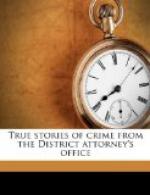While “wire-tapping” differed technically from the precise frauds committed by McCord and Livingston, it nevertheless closely resembled those swindlers in general character and came clearly within the doctrine that the law was not designed to protect “rogues in their dealings with each other.”
No genuine attempt had ever been made to prosecute one of these gentry until the catastrophe which deprived Felix of his $50,000. The “wire-tappers” rolled in money. Indeed, the fraternity were so liberal with their “rolls” that they became friendly with certain police officials and intimately affiliated with various politicians of influence, a friend of one of whom went on Summerfield’s bond, when the latter was being prosecuted for the “sick-engineer” frauds to the extent of $30,000. They regularly went to Europe in the summer season and could be seen at all the race-courses and gambling resorts of the Continent. It is amusing to chronicle in this connection that just prior to McPherson’s arrest—that is to say during the summer vacation of 1904—he crossed the Atlantic on the same steamer with an assistant district attorney of New York county, who failed to recognize his ship companion and found him an entertaining and agreeable comrade.
The trial came on before Judge Warren W. Foster in Part 3 of the General Sessions on February 27th, 1906. A special panel quickly supplied a jury, which, after hearing the evidence, returned in short order a verdict of guilty. As Judge Foster believed the McCord case to be still the law of the State, he, of his own motion, and with commendable independence, immediately arrested judgment. The People thereupon appealed, the Court of Appeals sustained Judge Foster, and the defendant was discharged. It is, however, satisfactory to record that the Legislature at its next session amended the penal code in such a way as to entirely deprive the wire-tappers and their kind of the erstwhile protection which they had enjoyed under the law.
V
The Franklin Syndicate
When Robert A. Ammon, a member of the New York bar, was convicted, after a long trial, on the 17th of June, 1903, of receiving stolen goods, he had, in the parlance of his class, been “due” for a long time. The stolen property in question was the sum of thirty thousand five hundred dollars in greenbacks, part of the loot of the notorious “Franklin Syndicate,” devised and engineered by William F. Miller, who later became the catspaw of his legal adviser, the subject of this history.
Ammon stood at the bar and listened complacently to his sentence of not less than four years at hard labor in Sing Sing. A sneer curved his lips as, after nodding curtly to his lawyer, he turned to be led away by the court attendant. The fortune snatched from his client had procured for him the most adroit of counsel, the most exhaustive of trials. He knew that nothing had been left undone to enable him to evade the consequences of his crime, and he was cynically content.




